

Hannah Arendt. Life and career[edit] Arendt was born into a secular family of German Jews in Linden (present-day Hanover), the daughter of Martha (born Cohn) and Paul Arendt.[7] She grew up in Königsberg (renamed Kaliningrad and annexed to the Soviet Union in 1946) and Berlin.
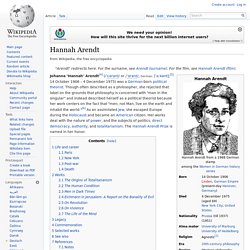
At the University of Marburg, she studied philosophy with Martin Heidegger. According to Hans Jonas, her only German-Jewish classmate, Arendt embarked on a long and stormy romantic relationship with Heidegger, for which she later was criticized because of Heidegger's support for the Nazi Party when he was rector at the University of Freiburg. Socialism. Socialism is a range of economic and social systems characterised by social ownership and democratic control of the means of production,[10] as well as the political theories and movements associated with them.[11] Social ownership may refer to forms of public, collective or cooperative ownership, or to citizen ownership of equity.[12] There are many varieties of socialism and there is no single definition encapsulating all of them,[13] though social ownership is the common element shared by its various forms.[5][14][15] Etymology The origin of the term "socialism" may be traced back and attributed to a number of originators, in addition to significant historical shifts in the usage and scope of the word.
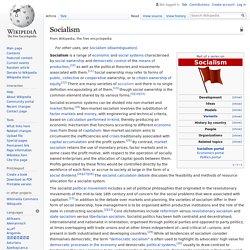
For Andrew Vincent, "[t]he word ‘socialism’ finds its root in the Latin sociare, which means to combine or to share. The related, more technical term in Roman and then medieval law was societas. History Early socialism Paris Commune First International Second International Early 20th century. Fascism. Fascism (/ˈfæʃɪzəm/) is a form of radical authoritarian ultranationalism,[1][2] characterized by dictatorial power, forcible suppression of opposition and strong regimentation of society and of the economy,[3] which came to prominence in early 20th-century Europe.[4] The first fascist movements emerged in Italy during World War I before it spread to other European countries.[4] Opposed to liberalism, Marxism and anarchism, fascism is usually placed on the far-right within the traditional left–right spectrum.[5][6][7][4][8][9] Fascists saw World War I as a revolution that brought massive changes to the nature of war, society, the state and technology.
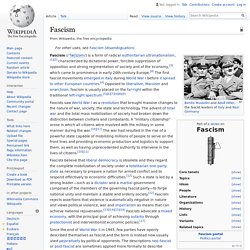
The advent of total war and the total mass mobilization of society had broken down the distinction between civilians and combatants. Etymology Definitions John Lukacs, Hungarian-American historian and Holocaust survivor, argues that there is no such thing as generic fascism. Position in the political spectrum "Fascist" as a pejorative History. Nazism. Nazism, or National Socialism in full (German: Nationalsozialismus), is the ideology and practice associated with the 20th-century German Nazi Party and state as well as other related far-right groups.
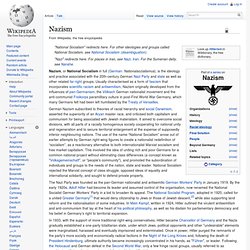
Usually characterised as a form of fascism that incorporates scientific racism and antisemitism, Nazism originally developed from the influences of pan-Germanism, the Völkisch German nationalist movement and the anti-communist Freikorps paramilitary culture in post-First World War Germany, which many Germans felt had been left humiliated by the Treaty of Versailles. German Nazism subscribed to theories of racial hierarchy and social Darwinism, asserted the superiority of an Aryan master race, and criticised both capitalism and communism for being associated with Jewish materialism.
The Nazi Party was founded as the pan-German nationalist and antisemitic German Workers' Party in January 1919. Etymology Position in the political spectrum Origins Völkisch nationalism. Free market. For economic systems coordinated by either free markets or regulated markets, see Market economy.
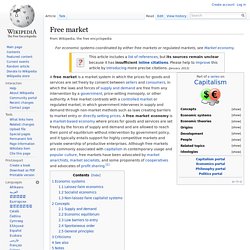
A free market is a market system in which the prices for goods and services are set freely by consent between sellers and consumers, in which the laws and forces of supply and demand are free from any intervention by a government, price-setting monopoly, or other authority. A free market contrasts with a controlled market or regulated market, in which government intervenes in supply and demand through non-market methods such as laws creating barriers to market entry or directly setting prices. A free market economy is a market-based economy where prices for goods and services are set freely by the forces of supply and demand and are allowed to reach their point of equilibrium without intervention by government policy, and it typically entails support for highly competitive markets and private ownership of productive enterprises.
Economic systems[edit] Laissez-faire economics[edit] Notes[edit] Feudalism. Feudalism was a set of legal and military customs in medieval Europe that flourished between the 9th and 15th centuries.
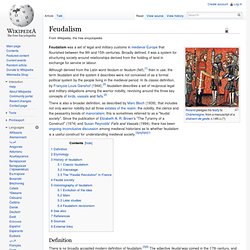
Broadly defined, it was a system for structuring society around relationships derived from the holding of land in exchange for service or labour. Although derived from the Latin word feodum or feudum (fief),[1] then in use, the term feudalism and the system it describes were not conceived of as a formal political system by the people living in the medieval period. In its classic definition, by François-Louis Ganshof (1944),[2] feudalism describes a set of reciprocal legal and military obligations among the warrior nobility, revolving around the three key concepts of lords, vassals and fiefs.[2] There is also a broader definition, as described by Marc Bloch (1939), that includes not only warrior nobility but all three estates of the realm: the nobility, the clerics and the peasantry bonds of manorialism; this is sometimes referred to as a "feudal society". Definition. Capitalism. The degree of competition, role of intervention and regulation, and scope of state ownership varies across different models of capitalism.[5] Economists, political economists, and historians have taken different perspectives in their analysis of capitalism and recognized various forms of it in practice.
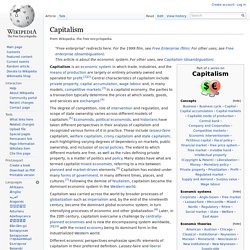
These include laissez-faire capitalism, welfare capitalism, crony capitalism and state capitalism; each highlighting varying degrees of dependency on markets, public ownership, and inclusion of social policies. The extent to which different markets are free, as well as the rules defining private property, is a matter of politics and policy.
Many states have what are termed capitalist mixed economies, referring to a mix between planned and market-driven elements.[6] Capitalism has existed under many forms of government, in many different times, places, and cultures.[7] Following the demise of feudalism, capitalism became the dominant economic system in the Western world. Etymology[edit]